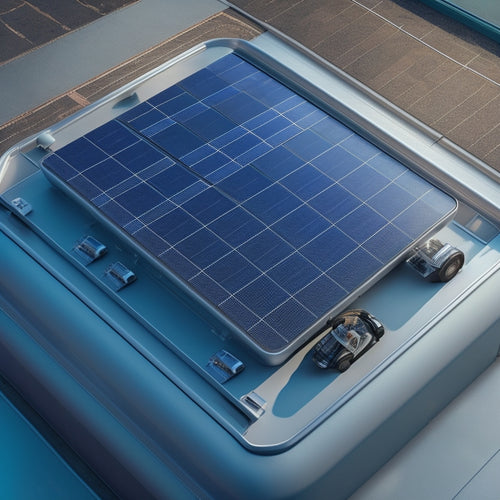
How Much Does a Home Solar Power System Cost
Share
You can expect to pay between $10,000 and $30,000 to install a home solar power system, depending on the system size, equipment quality, and installation complexity. The average cost per watt ranges from $2.50 to $4.00, so a small system (2-3 kW) would cost around $10,000 to $15,000, while a larger system (7-10 kW) would cost around $22,000 to $30,000. Factors like location, brand quality, and installation type also impact pricing. As you consider your options, you'll want to weigh these factors against the long-term savings and environmental benefits that come with switching to solar power - and there's more to investigate in this expedition to a cleaner, more sustainable energy future.
Key Takeaways
- The cost of a home solar power system varies from $10,000 to $30,000, depending on system size and type.
- System size, location, brand quality, installation complexity, and equipment type are key factors influencing pricing.
- Federal tax credits can cover up to 26% of the total cost, and local rebates may offer $0.25 to $1.25 per watt.
- Average installation costs range from $10,000 to $15,000 for small systems, $15,000 to $22,000 for medium systems, and $22,000 to $30,000 for large systems.
- Additional costs may include inverters, mounting hardware, and permits, but financing options like loans and leases can spread costs over time.
Understanding Solar Panel Costs
As you investigate the world of home solar power systems, getting a handle on solar panel costs is essential.
You'll need to take into account the type of solar panels you want, as prices vary considerably. For instance, monocrystalline silicon panels are more expensive than polycrystalline silicon panels, but they're also more efficient. Thin-film panels are another option, offering a lower upfront cost but lower efficiency as well.
You'll also need to reflect on where you'll install your solar panels. Roof-mounted systems are the most common, but ground-mounted systems can be more efficient if you have the space.
Installation locations with more sunlight hours per day, such as southern-facing roofs or open fields, will require fewer panels to generate the same amount of power. This can affect your overall cost.
Factors Affecting System Pricing
You're likely wondering what drives the cost of a home solar power system beyond the type and installation location of solar panels. Several factors come into play, and understanding them can help you make an informed decision when investing in a system.
System size is a significant factor, as larger systems require more equipment and labor. Location impact also plays a role, as systems installed in areas with high labor costs or complex permitting processes will be more expensive.
Brand quality is another consideration, as high-efficiency panels from reputable manufacturers typically come at a premium. Installation complexity, such as the need for additional electrical infrastructure or custom mounting solutions, can also drive up costs.
The type of equipment used, including inverters and mounting hardware, also affects pricing. Energy efficiency is a key consideration, as more efficient systems can generate more power with fewer panels.
Additionally, the quality of the installation itself, including the experience and certifications of the installers, can impact the overall cost of the system. By considering these factors, you can better understand the cost of a home solar power system and make informed decisions about your investment.
Average Cost of Installation
Understanding the factors that influence system pricing is vital, but it's equally important to know the average cost of installation. As you consider investing in a home solar power system, you'll want to get a sense of the typical costs associated with installation.
According to current installation trends, the average cost of installation ranges from $15,000 to $30,000, depending on the system size and quality. Here's a breakdown of what you can expect:
- A small system (2-3 kilowatts) can cost between $10,000 and $15,000
- A medium system (4-6 kilowatts) can cost between $15,000 and $22,000
- A large system (7-10 kilowatts) can cost between $22,000 and $30,000
Keep in mind that these figures don't include additional costs, such as inverters, mounting hardware, and permits.
Fortunately, there are financing options available to help make your solar power system more affordable. You may be able to secure a loan or lease a system, which can help spread the cost over time.
Incentives and Rebate Options
While investing in a home solar power system may seem costly, there are incentives and rebates that can greatly reduce the financial burden.
As a homeowner, you're eligible for federal incentives, which can cover up to 26% of the total system cost through tax credits. In addition, local rebates and utility programs can provide additional discounts.
For instance, some utility companies offer rebates for installing solar panels, which can range from $0.25 to $1.25 per watt. You can also investigate financing options, such as loans or power purchase agreements, to spread the cost over time.
Moreover, going solar can bring environmental benefits, like reducing your carbon footprint and contributing to a cleaner energy mix.
Long-Term Savings and ROI
The initial investment in a home solar power system can be substantial, but it's essential to evaluate the long-term savings and return on investment (ROI) it provides.
You'll want to take into account how much you'll save on your electricity bills and how quickly you'll recoup your investment.
-
Your solar power system will generate free energy for 25 years or more, reducing your reliance on the grid and saving you money on your electricity bills.
-
By investing in a home solar power system, you're contributing to a cleaner environment and reducing your carbon footprint, which has a positive impact on the environment.
-
With energy independence, you'll be shielded from rising electricity rates and price fluctuations, giving you more control over your energy costs and budget.
Frequently Asked Questions
Can I Install a Home Solar Power System Myself?
You can attempt a DIY installation, but it's essential you obtain necessary solar permits and follow local building codes; however, considering the complexity and potential risks, it's often recommended to hire a licensed professional for a safe and efficient setup.
How Long Does a Typical Solar Panel Warranty Last?
You'll typically find that solar panels come with a warranty that lasts between 25 to 30 years, offering extensive warranty coverage for that duration, ensuring you're protected from defects and performance issues during the warranty duration.
Are Solar Panels Prone to Damage From Hail or Heavy Snow?
You'll be surprised to know that 99% of solar panels can withstand hail up to 1 inch in diameter! When it comes to your solar panels, you can rest assured that most are designed with hail resistance and snow load capacities in mind.
Can I Sell Excess Energy Back to the Grid?
You can sell excess energy back to the grid through net metering benefits, where the utility company credits you at their energy buyback rates, allowing you to offset your energy consumption and even earn revenue.
Do Solar Panels Require Regular Cleaning and Maintenance?
Your solar panels are like a well-oiled machine, but dust and debris can gum up the works, reducing efficiency. You'll need to clean them every 6-12 months to maintain peak performance, with more frequent maintenance in dusty or polluted areas.
Related Posts
-

Top Solar Panels for Car Battery Maintenance
When selecting top solar panels for car battery maintenance, consider high-efficiency models with high wattage output...
-

10 Best Solar Panel Options for Motorhomes Online
When choosing the best solar panel for your motorhome, consider factors like efficiency, durability, and design. You'...
-

Safety First: Why Seniors Need Advanced Vehicle Features
As you get behind the wheel, you're likely unaware that seniors are 16% more likely to be involved in a fatal car cra...


